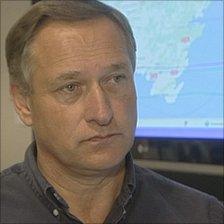Inquiry into missing gas balloonists expected
- Published
Gordon Bennett Race Cup director Don Cameron on missing balloonists Richard Abruzzo and Carol Rymer Davis
Gas balloonist David Hempleman-Adams has said he expects an inquiry after two fellow balloonists went missing, feared dead, in a race.
The event's organisers said on Friday that new radar information on the missing Americans suggested they were "unlikely to have survived".
Mr Hempleman-Adams, from Wiltshire, came third in the Gordon Bennett race and said he had had the option of using the same route as the missing pair.
"It's an incredibly sobering thought."
The missing pilots, Richard Abruzzo and Carol Rymer Davis, disappeared on Wednesday over the Adriatic Sea.
'Bunch of brothers'
Race director Don Cameron told the BBC: "The rate of descent at the last moment was about 50mph (80km/h). If that's correct it's very pessimistic news."
Twenty hydrogen-filled balloons launched from a site near Bristol on 25 September.
A Gala Dinner for competitors will be going ahead in Bristol on Saturday evening, but organisers said it would be a tribute to the two American balloonists rather than a celebration.
Mr Hempleman-Adams said: "I think people don't realise, these gas balloonists, there's a relatively small number and we are a small bunch of brothers from around the world and get together once a year and we know each other very well.

Mr Hempleman-Adams said balloons could land in places airplanes could not
"It's a real shock at the moment that something terrible might have happened to them, even more so because we were using the same weatherman and we could have taken that same track that they did and we were given that option and so we could have been in exactly the same position."
He continued: "I'm sure there will be an inquiry to see what happened. I don't know if there will be anything you could actually do in those circumstances.
"One of the problems with the weather on these long-distance balloon flights is you can start off as we did, from Bristol, with the four-day forecast and the first day is always very accurate, but the longer you go on it changes.
"It's all down to the pilot. You will get the weather coming in and you have an option at all times to land.
"One of the advantages of the balloon is you can actually land at night, in the trees or on the water, whereas you can't do that with a small aeroplane.
"Sometimes, if there's a big thunderstorm coming in - the weatherman should normally pick that up - normally you would go down to sea level or ground level and try and let the storm go over, or just land, so I think that will be one of the things that comes up in questions."
The search for the missing balloonists is being led by the Italian Maritime Rescue Co-ordination Centre (MRCC).
'Needle in a haystack'
The Italian coastguard last had contact with the pair, who won the race in 2004, at 0800 local time (0700 BST) on Wednesday when they reported bad weather conditions.
Organisers at the Gordon Bennett control centre said they had examined the transponder readings from the missing balloonists and calculated the change in height of the balloon over the time period recorded.
This data indicated the balloon had a moderate descent rate initially which then increased into a high rate of descent, of about 50mph.
Mr Abruzzo's wife, Nancy, said she was praying for good news.
"We recognise that we are looking for a needle in a haystack but we cannot rest until we find something, anything."
- Published1 October 2010
- Published30 September 2010
- Published30 September 2010
- Published29 September 2010